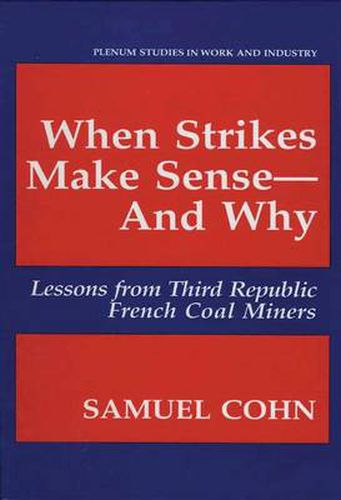Readings Newsletter
Become a Readings Member to make your shopping experience even easier.
Sign in or sign up for free!
You’re not far away from qualifying for FREE standard shipping within Australia
You’ve qualified for FREE standard shipping within Australia
The cart is loading…






This title is printed to order. This book may have been self-published. If so, we cannot guarantee the quality of the content. In the main most books will have gone through the editing process however some may not. We therefore suggest that you be aware of this before ordering this book. If in doubt check either the author or publisher’s details as we are unable to accept any returns unless they are faulty. Please contact us if you have any questions.
Social scientists have not helped the working class make strategic deci sions. Unionists need to know how to carry on industrial conflict so as to provide concrete economic benefits for their members. Should unions strike or not strike? Should losses be avoided at all costs, or can unions afford to take chances? Does economism gut the class power of workers or provide a pragmatic strategy for increasing workers’ wage gains? We can say with great confidence that workers should join unions; there is now an exhaustive and compelling literature demonstrating that union membership provides a wide variety of economic benefits. We can say that corporatist class compromises lower income but increase job security and overall employment. Beyond that, however, we cannot say much. In particular, we can do little to advise particular unions in partic ular fixed institutional and political environments how they should han dle the microtactics of individual confrontations. The United Farm Work ers do not need a speech about the miracle of the Swedish industrial relations system. They need to know whether they should strike or not strike, and how their tactics should change if rival Teamsters come into the field. Unfortunately, medical research often has to start with rabbits be fore it proceeds to humans, and so it is with research in industrial conflict. The realistic prospects of doing a large sample analysis of con temporary American wage settlements that simultaneously estimates the effects of union tactics and economic factors are poor.
$9.00 standard shipping within Australia
FREE standard shipping within Australia for orders over $100.00
Express & International shipping calculated at checkout
This title is printed to order. This book may have been self-published. If so, we cannot guarantee the quality of the content. In the main most books will have gone through the editing process however some may not. We therefore suggest that you be aware of this before ordering this book. If in doubt check either the author or publisher’s details as we are unable to accept any returns unless they are faulty. Please contact us if you have any questions.
Social scientists have not helped the working class make strategic deci sions. Unionists need to know how to carry on industrial conflict so as to provide concrete economic benefits for their members. Should unions strike or not strike? Should losses be avoided at all costs, or can unions afford to take chances? Does economism gut the class power of workers or provide a pragmatic strategy for increasing workers’ wage gains? We can say with great confidence that workers should join unions; there is now an exhaustive and compelling literature demonstrating that union membership provides a wide variety of economic benefits. We can say that corporatist class compromises lower income but increase job security and overall employment. Beyond that, however, we cannot say much. In particular, we can do little to advise particular unions in partic ular fixed institutional and political environments how they should han dle the microtactics of individual confrontations. The United Farm Work ers do not need a speech about the miracle of the Swedish industrial relations system. They need to know whether they should strike or not strike, and how their tactics should change if rival Teamsters come into the field. Unfortunately, medical research often has to start with rabbits be fore it proceeds to humans, and so it is with research in industrial conflict. The realistic prospects of doing a large sample analysis of con temporary American wage settlements that simultaneously estimates the effects of union tactics and economic factors are poor.